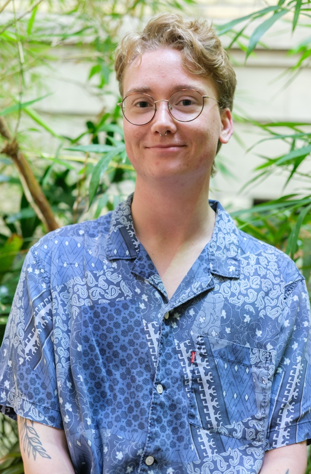Breadcrumbs
- Home
- About Us
- About the Department
- Humans of IMM
- Ash Haggerman
Profile: Ash Haggerman

What is your name?
Ash Hagerman.
What is your role in the department?
I’m a PhD student, just finishing up my third year in Dr. Clint Robbins’ Lab. I’m studying how the Notch signaling pathway can coordinate immune regulatory functions in B-lineage cells, specifically how it links plasma cell differentiation with immune regulatory functions to generate regulatory plasma cells.
How has your lived experience shaped your career in the scientific field?
I’m trans. Being a trans scientist can feel pretty lonely since we’re underrepresented in this field. It kind of makes sense in my mind as to why, because immunology - or science in general - is a really binary field: there's pro-inflammatory and anti-inflammatory responses; there's TH1, there's TH2, TH17 - it’s all very categorical and confined into these subsets. But in reality, there is a lot of nuance and plasticity in any immune response and in cell states and functions. I think trans people maybe have an easier time challenging those dominant assumptions because we already struggle fitting into societal binaries and just need to challenge the status quo to live authentically. Being trans and neurodivergent has helped me be super curious and passionate about research, and really rigorous in thinking about paradigms that lay out the field — even down to experimental details.
In addition to those aspects of my identity, I have a lot of privilege; I'm white, I'm able-bodied, masc presenting, but also previously lived and experienced life as a female. I understand that women in science are often not heard out by their male counterparts, especially women of colour, and need to work extra hard to prove themselves. As a scientist, I want to advocate, be inclusive, and amplify the voices of marginalized people to make science more accessible for everybody, especially those on the margins of what’s deemed normal in Western society.
What is one lesson you have learned along your academic/career journey that you would share with aspiring scientists?
Imposter syndrome can hit super hard and comes in waves, like grief does. It’s really easy to compare yourself to others, especially if you already have trouble fitting into what's considered normal. Everyone’s definition of success and productivity looks different. So instead of fixating on how you compare to others and how productive you are, focus on following your own scientific curiosity and just owning your own research project, and advocating for how your research should go. Try to be a leader and keep in mind why being a scientist is important to you. Having meaning on why you’re pursuing this graduate degree gives you a bigger picture to not get so bogged down by feeling like you don't belong or that you should just give up.
What is something you are passionate about, outside of your work?
I’m really passionate about inclusion and community, especially for the trans community. I’m part of the Faculty of Medicine Trans and Gender-Diverse Gathering Committee. We’re trying to create a community because we are quite rare, especially in research. We organize social interactions, networking opportunities, and work to identify and address systemic issues at UofT that create barriers for trans people. I appreciate being part of something that unites people and allows for resource and opportunity sharing, which can help trans people complete their degrees and be successful in their fields. We have important insight to bring as scientists or doctors, and there are a lot of internal and external challenges we are always dealing with. Having that understanding and experience with people, getting to talk about it, and doing something pleasant together is really nice.
Also, many trans people don’t know they have healthcare coverage for gender-affirming care, outside of OHIP/UHIP coverage. The Faculty of Medicine is very siloed across institutions, and they often have different health insurance plans. I’m making a guidebook to help trans and gender-diverse people at UofT know how to access their health insurance coverage, and where to get referrals for surgery or prescriptions related to gender-affirming care because that can be confusing to navigate. In my experience, you have to educate yourself on how to access care and self-advocate when working with your healthcare providers to get the care you need. The guide will be published in the Fall (likely on the Office of Inclusion and Diversity website) for people in the faculty at any career stage to figure out how to access the resources they need to be able to feel good about themselves and get the care they need.
Who is a scientist you admire and why?
It would probably be Jennifer Doudna. Ever since I learned about CRISPR and gene therapies — the reason I got into science was genetics — I was like WOW! This tool is groundbreaking and could transform lives, especially for people living with life-threatening genetic diseases. Like the gene therapy for sickle cell and beta-thalassemia — I think that’s brilliant.
If you are interested in joining the Faculty of Medicine Trans and Gender-Diverse community, please reach out to ash.hagerman@mail.utoronto.ca to be notified of future events
